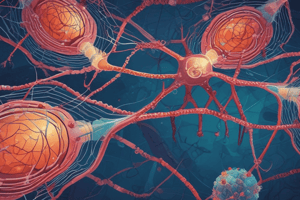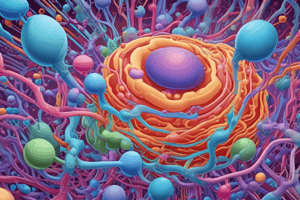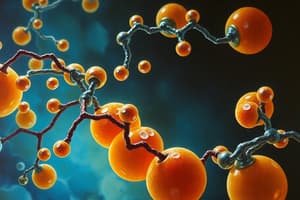Podcast
Questions and Answers
Which component of the immune system is primarily made up of proteins?
Which component of the immune system is primarily made up of proteins?
- Transport proteins
- Hormones
- Antibodies (correct)
- Enzymes
Which type of protein mediates the immune response?
Which type of protein mediates the immune response?
- Enzymes
- Immunoglobulins (correct)
- Structural proteins
- Storage proteins
Which proteins are involved in transporting ions and molecules across a membrane?
Which proteins are involved in transporting ions and molecules across a membrane?
- Hormones
- Transport proteins (correct)
- Enzymes
- Immunoglobulins
Which type of protein serves as reserves of metal ions and amino acids?
Which type of protein serves as reserves of metal ions and amino acids?
Which proteins control the actions of cells or organs?
Which proteins control the actions of cells or organs?
Flashcards
What are Antibodies?
What are Antibodies?
Proteins of the immune system that bind to antigens, neutralizing or marking them for destruction.
What are Immunoglobulins?
What are Immunoglobulins?
Also known as antibodies, these mediate the immune response by recognizing and binding to specific antigens.
What are Transport Proteins?
What are Transport Proteins?
Proteins that facilitate the movement of ions and other molecules across cellular membranes.
What are Storage Proteins?
What are Storage Proteins?
Signup and view all the flashcards
What are Hormones?
What are Hormones?
Signup and view all the flashcards
Study Notes
Immune System Proteins
- The immune system is primarily composed of proteins known as antibodies, which play a critical role in identifying and neutralizing pathogens.
Mediators of Immune Response
- Immunoglobulins (Ig), commonly referred to as antibodies, are the proteins that mediate immune responses by specifically binding to antigens.
Transport Proteins
- Integral membrane proteins facilitate the transport of ions and molecules across cell membranes, essential for maintaining cellular homeostasis and signaling.
Storage Proteins
- Metalloproteins serve as reserves, holding metal ions and amino acids, which are vital for various cellular functions and metabolic processes.
Regulatory Proteins
- Hormones and cytokines act as regulatory proteins that control the actions of cells or organs, orchestrating responses to stimuli and maintaining physiological balance.
Studying That Suits You
Use AI to generate personalized quizzes and flashcards to suit your learning preferences.




